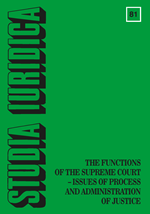La Cour Suprême et ses fonctions dans le système judiciaire polonaise
The Supreme Court and its functions in the Polish judicial system
Author(s): Walerian SanetraSubject(s): Politics / Political Sciences, Law, Constitution, Jurisprudence, Public Administration
Published by: Wydawnictwa Uniwersytetu Warszawskiego
Keywords: Supreme Court; functions of the Supreme Court; cassation court; Sąd Najwyższy; funkcje Sądu Najwyższego; sąd kasacyjny
Summary/Abstract: The author asserts that the organization of judicial system in each country is a result of a long evolution triggered by political, economic, social and cultural developments. The Polish Supreme Court was created in 1917, but its current shape is an outcome of changes initiated in 1990s, most notably the entrance into force of the new Polish Constitution in 1997. The author analyses the notion of judicial power by juxtaposing a functional approach and a structural approach. Next, he remarks that the most important function of the Polish Supreme Court is to ensure the uniformity of jurisprudence by examining cassation complaints. Among other functions of the Supreme Court, the author enumerated examination of electoral protests, declaring the validity of elections of executive and legislative authorities, stating the validity of national referendums. The author emphasized that some specific duties of the Supreme Court are stipulated not only in the Constitution, but also in other legal acts. By presenting a wide range of attributes bestowed upon the Supreme Court, the author also invoked the duty of examining complaints against the excessive length of the proceedings, complaints for declaring a final judgment contrary to law, the appellate measures in disciplinary cases involving judges, prosecutors and legal advisors as well as appellate measures against the decisions of the National Judiciary Council. In addition to it, the author hinted at the Supreme Court’s obligation to control acts adopted by the authorities of self-governing bodies of attorneys, notaries, legal advisors and bailiffs. The author comes to the conclusion that the Supreme Court in Poland cannot be described as a typical cassation court. Although its principle role is to examine cassation complaints with a view to ensure uniformity of jurisprudence and its conformity with law, it also fulfils many other functions that are of great significance for the legal order in Poland.
Journal: Studia Iuridica
- Issue Year: 2019
- Issue No: 81
- Page Range: 103-122
- Page Count: 20
- Language: French

